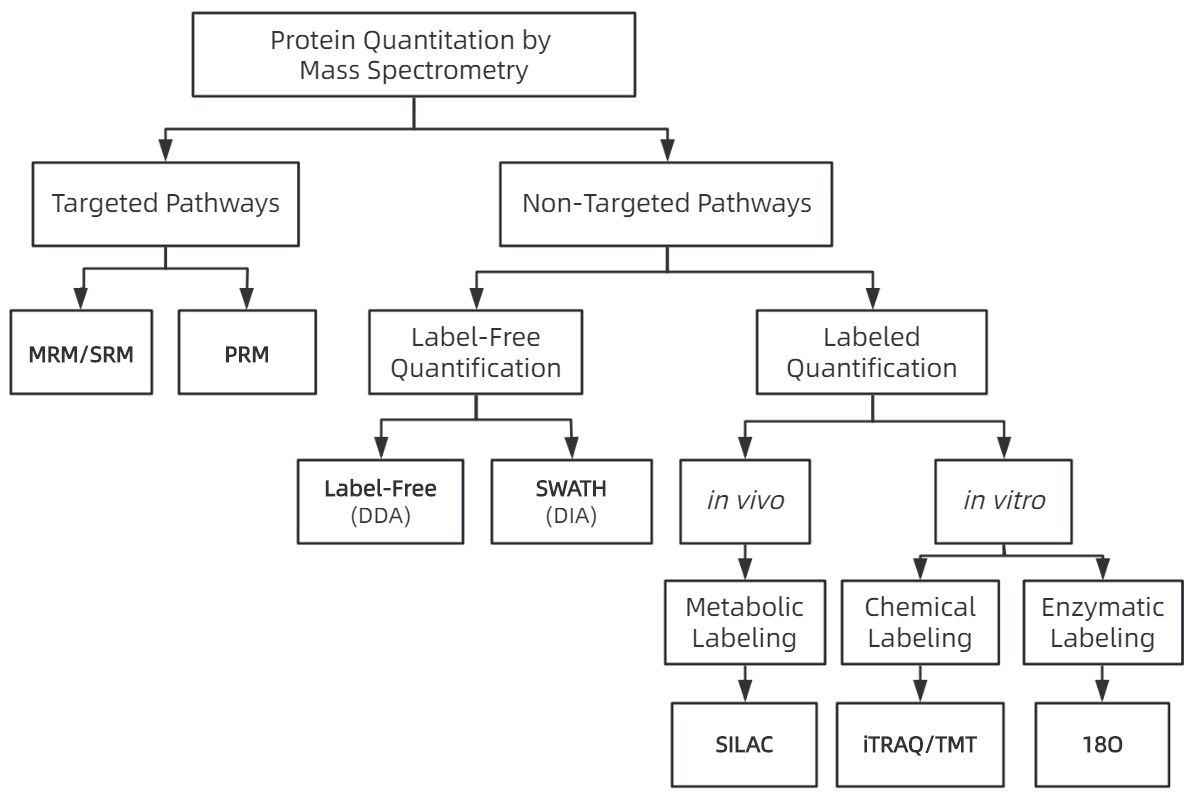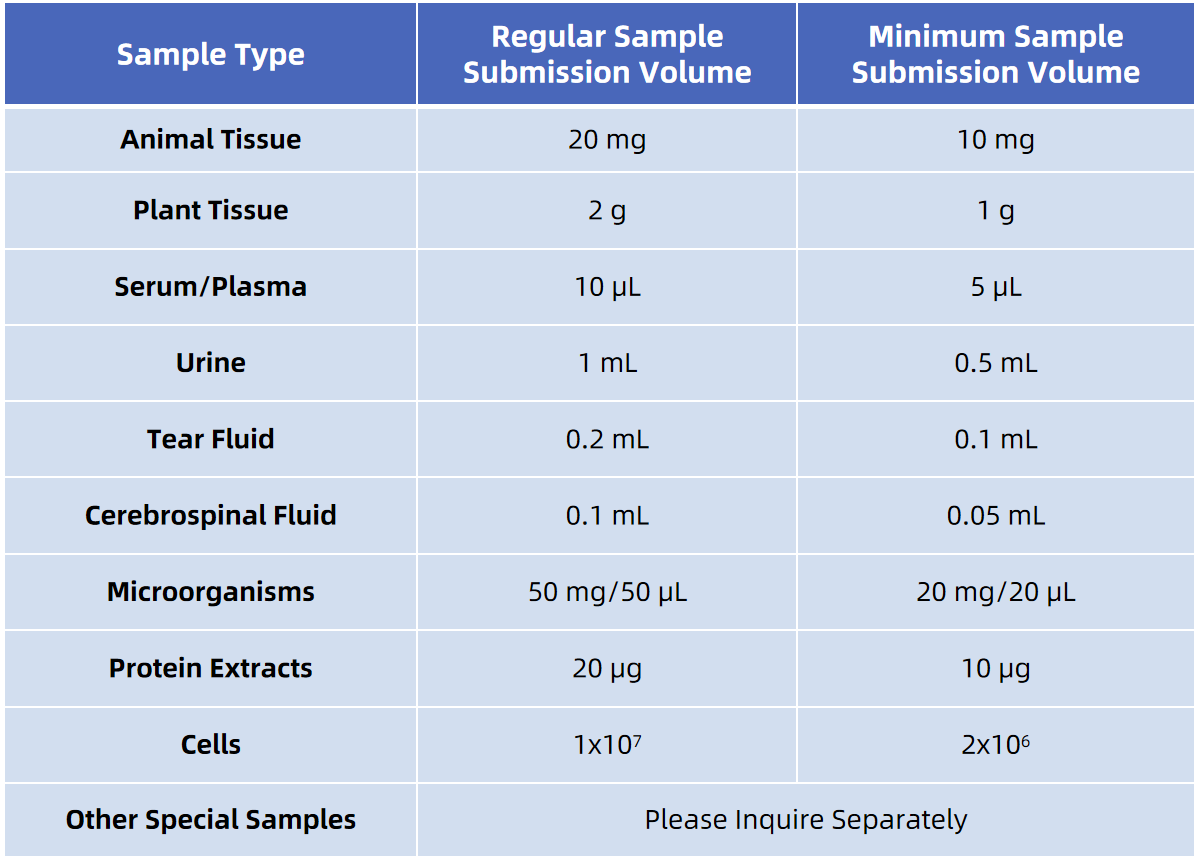Protein Quantitation by Mass Spectrometry Service
- MRM/SRM: These techniques are designed to quantify specific proteins with high specificity and reliability, making them ideal for validation studies where consistency is crucial.
- PRM: PRM uses high-resolution mass spectrometry for accurate and reproducible quantification, particularly suited for complex samples. This approach provides a precise measurement of target proteins, ensuring high data quality and repeatability in challenging biological matrices.
- SILAC: SILAC is ideal for cell-based studies, as it integrates stable isotopes during cell culture to ensure precise measurement of protein abundance changes with minimal experimental variability.
- TMT/iTRAQ: These isobaric labeling methods support multiplexed quantification, enabling simultaneous analysis of multiple samples in a single experiment. TMT and iTRAQ are highly suitable for large-scale comparative studies.
- 18O Labeling: This method uses 18O-enriched water to label peptides post-digestion, providing an alternative for accurate quantification across various experimental setups.
- Label-Free: Label-free quantitation uses data-dependent acquisition (DDA) mode to capture proteome-wide data for relative quantification, allowing for high sample throughput and extensive protein coverage without isotope labeling.
- SWATH: SWATH uses data-independent acquisition (DIA) mode to enable high-throughput, comprehensive protein profiling without prior target selection, making it ideal for exploratory studies aimed at capturing a broad range of proteins.
Protein quantitation by mass spectrometry is a cutting-edge tool designed to precisely measure both absolute protein quantities and relative abundance changes in complex biological samples. Through label-free methods (such as SWATH) and labeling techniques (such as SILAC, iTRAQ, and TMT), mass spectrometry enables in-depth analysis of dynamic protein expression across cells, tissues, and biofluids. This service is ideal for a range of research needs, including biomarker discovery, drug response analysis, and biological pathway elucidation.
MtoZ Biolabs offers specialized Protein Quantitation by Mass Spectrometry Service, leveraging advanced platforms and extensive technical expertise to deliver high-quality, tailored analysis plans. We ensure data accuracy and reliability, empowering clients to achieve scientific breakthroughs and innovative insights.
Services at MtoZ Biolabs
MtoZ Biolabs offers an extensive suite of Protein Quantitation by Mass Spectrometry Service, designed to address diverse research objectives through either protein-centric or peptide-centric approaches. Our mass spectrometry-based quantification techniques are organized into two primary categories: Targeted Quantification and Non-Targeted Quantification. Each approach is optimized to deliver accurate and reproducible data tailored to the specific requirements of each project.
1. Targeted Quantification
Our targeted protein quantification services focus on pre-selected proteins, enabling precise and highly reproducible measurements essential for biomarker validation and pathway-focused research.
2. Non-Targeted Quantification
Non-targeted protein quantification is suitable for system-wide profiling, allowing for a broad analysis of protein expression patterns and is particularly beneficial for exploratory studies.
2.1 Label-Based Quantification
Label-based approaches incorporate stable isotopes into proteins or peptides, facilitating accurate relative or absolute quantification across various conditions. The primary techniques include:
2.2 Label-Free Quantification
Label-free quantification retains the natural isotopic composition of samples, offering a cost-effective and scalable option for relative quantification in large studies. Techniques in this category include:

Figure 1. Protein Quantitation by Mass Spectrometry
Analysis Workflow

Service Advantages
Why Choose MtoZ Biolabs?
1. Advance Analysis Platform: MtoZ Biolabs established an advanced protein quantitation analysis platform, guaranteeing reliable, fast, and highly accurate analysis service.
2. Comprehensive Quantification Options: We provide a variety of quantification methods, including both labeled and label-free approaches, allowing precise and adaptable protein quantitation based on specific research requirements.
3. Multi-Sample Compatibility: Our platform supports a wide variety of biological samples, including cells, tissues, blood, and bodily fluids, providing flexibility to accommodate diverse research demands.
4. High-Data-Quality: Deep data coverage with strict data quality control. AI-powered bioinformatics platform integrate all protein quantitation analysis data providing clients with a comprehensive data report.
5. One-Time-Charge: Our pricing is transparent, no hidden fees or additional costs.
Sample Submission Suggestions

Applications
Biomarker Discovery and Validation: Facilitates the identification and quantification of disease-related biomarkers, enhancing early diagnostic and monitoring capabilities.
Disease Mechanism Analysis: Enables quantitative profiling of protein expression changes to reveal key regulatory pathways involved in disease processes.
Drug Target Evaluation: Assesses the impact of candidate drugs on target proteins, providing precise quantification essential for drug development and efficacy testing.
Dynamic System Studies: Allows the tracking of protein abundance over time or in response to external stimuli, ideal for systems biology and response profiling studies.
Deliverables
1. Comprehensive Experimental details
2. Materials, Instruments, and Methods
3. Total Ion Chromatogram & Quality Control Assessment
4. Data Analysis, Preprocessing, and Estimation
5. Bioinformatics Analysis
6. Raw Data Files
At MtoZ Biolabs, we utilize world-class mass spectrometry platforms, including the Thermo Fisher Q Exactive HF, Orbitrap Fusion, and Orbitrap Fusion Lumos, integrated with Nano-LC nanoliter liquid chromatography systems, to deliver high-precision protein quantitation. We offer both labeling methods and label-free quantitation, providing reliable and sensitive analysis for complex peptide and protein samples. By combining peptide ionization analysis with internal standards or calibration curves, we achieve high-sensitivity quantitation of protein concentrations. Additionally, for clients requiring traditional quantification, we provide UV absorption, BCA, and Bradford assays, offering flexible validation options to ensure comprehensive and reliable data. Free project evaluation, welcome to learn more details!
How to order?







